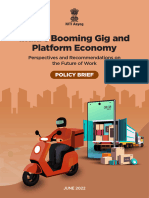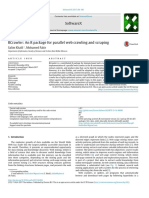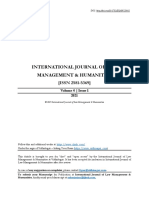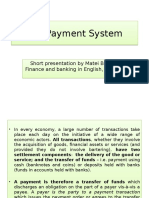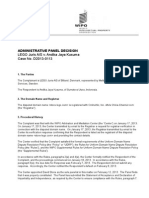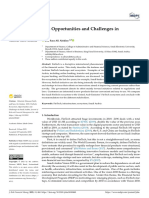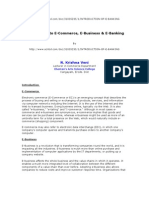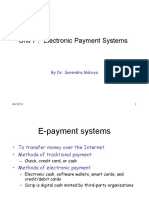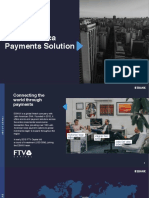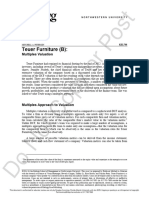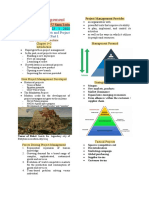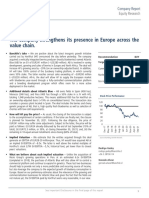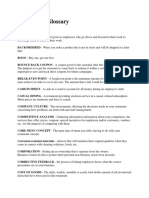The State of Freelancing
During COVID-19
An analysis of demand for global freelancing - now and the
day after - based on a survey of over 1,000 freelancers
�Introduction
As the world gets to grips with COVID-19, the remote workforce has
become the norm for the first time in modern history.
Freelancers and gig-workers share the same concerns for financial
stability and job security as the rest of the global workforce and are
left wondering what’s in store for the future of freelancing. Is this a
pivotal moment for freelancing with the potential to push it forward
10 years into the future with the new-found discovery that work
really can be done at a very high level remotely? Will the need to
reduce expenses result in businesses cutting freelancers, or will it
actually result in more outsourcing as they search for more flexible,
lower expenses alternatives to the traditional payroll?
In an attempt to better understand how COVID-19 has impacted
the freelance economy, we surveyed over 1,000 freelancers from
100+ countries, asking them to share how the pandemic has
impacted the demand for their services, their hourly rates and what
opportunities and risks they expect will arise from the crisis.
1
�Table of Contents
Key Takeaways 03
Freelancers Experiencing a Fall in Demand in the Short-Term as Fallout from COVID-19 03
Freelance Hourly Rates Remain Stable Despite Crisis 05
The Long-Term Future for Freelancing Post-COVID-19 Looks Very Optimistic 06
SMBs are Cutting Costs, yet Remote Opportunities are Emerging Strong 07
Summary 08
Connecting the World of Freelancing 09
32
�Key Takeaways Freelancers Experiencing a Fall in
Demand in the Short-Term as Fallout
Of the freelancers surveyed, 32% shared that demand for their services from COVID-19
has greatly decreased in light of COVID-19. But it’s not bad news for all
freelancers – 40% say that business has remained as usual or even
increased over the past 3 months.
We asked survey respondents if over the past three months, they’ve seen as shift
The greatest drop in demand came from clients in North America in demand for their freelancing services. Close to 32% of the freelancers surveyed
and Europe, while freelancers serving businesses in Asia and Australia mentioned that demand has decreased greatly, suggesting that the overall slowing
experienced slightly less impact. of the global economy has led to a slowdown in both ongoing activity and the start
of new projects with outsourced talent.
Nearly three-quarters of freelancers say that their hourly rate has
remained unchanged during this period, suggesting that they feel However, it’s not bleak news for all freelancers. In fact, 23% said that business
confident that their fees are fair and attractive even in the current climate. remained as usual with an additional 17% reporting that demand for their services
had increased during this period, perhaps as a way for businesses to fill some of
Freelancers managing teams are showing real resilience and most intend
the gaps left by a reduction in activity from their in-house team during this time.
to keep things stable despite the crisis. 74% answered that they are not
downsizing their team and 83% said they will not be reducing their
team’s pay.
Greatly increased 5.30%
Once COVID-19 is under control, 53% of freelancers believe demand Slightly increased 11.43%
will increase from what it was before, with a further 21% expecting
Remains same as usual 22.85%
demand to revert to how it was prior to the crisis.
Slightly decreased 28.79%
Freelance marketplaces have reported a rapid growth in new
freelancers entering the platforms, as well as steadiness in demand Greatly decreased 31.63%
for their services.
0% 10% 20% 30% 40%
*Total numbers may fall slightly below 100% in cases where some survey respondents
skipped the specific question.
43
�Many freelancers work for clients based all over the world, so we asked
how demand from clients in specific regions had been impacted. Based
on our results, freelancers with clients based in North America and
Europe reported the highest slowdown in demand. Asia and Australia
– regions which first felt the impact of the outbreak, have seen slightly
less of a decrease in demand for freelancers. This lends to the view that
demand for freelancers will rebound once the road to recovery begins all
around the world.
North America Europe Asia Australia
Freelance marketplaces lead the way in connecting talented
14.3% 14.4% 8.3% 6.3%
professionals with businesses that need their services. Since the outbreak
53.1% 46.2% 44.3%
of the pandemic, leading marketplaces have reported a rapid growth in new
32.7% 52.6% 33.0% 45.5% 49.4%
freelancers entering the platforms, as well as steadiness in the demand for
services from businesses worldwide.
Increased Remained the same Decreased
When taking a deeper look at the numbers, our survey showed that
freelancers in Ukraine – one of the fastest growing outsourcing locations -
“Remote work, and the talented freelancers who work remotely, will increasingly
have seen less of an impact. 56% of Ukrainian freelancers reported that
become the norm. The trends supporting this started well before the current crisis
demand from clients in North America either increased or remained the
and may be accelerated by the changes everyone is making to adapt to new realities.”
same and 50% stated that demand from Europe had not declined.
Hayden Brown
President & CEO of Upwork, commenting in Fortune
“Outsourcing has become one of the most promising industries for young
entrepreneurs in Ukraine. Ukrainian specialists can compete on equal terms
“While the development of the COVID-19 pandemic is uncertain and far from being
with service providers from all over the world and in fact, they’re doing very
over, we were encouraged to see that our marketplace was able to quickly rebound
well. Ukrainian IT outsourcing companies are definitely feeling the impact of the
and resume growth.”
crisis, but perhaps less so than other markets due to the high quality and more
affordable rates they offer over hiring locally.” Micha Kaufman
Founder and CEO of Fiverr, in a letter to shareholders
Michael Deinega
Payoneer Country Manager – Ukraine
4
�Freelance Hourly Rates Remain Stable Furthermore, freelancers managing their own team (21% of those surveyed)
have shown real resilience in protecting their employees and sub-contractors.
Despite Crisis 83% stated that they have kept their team’s rates the same or even increased
them in a few cases.
According to our recent 2020 Freelancer Income Report, the worldwide
average hourly rate charged by freelancers stood at $21/hour, higher than the Their rate will
remain the same 76.89%
$19 average rate when we last ran the survey two years earlier, and significantly
I am increasing
higher than the average global hourly rate for workers. We asked freelancers 5.78%
their rate
if they’ve made any changes to the rates they charge due to the pandemic. A
I am lowering
clear majority of freelancers mentioned that their rates have remained the their rate 17.33%
same or even gone up, while only 23% have lowered their hourly rates. This
signals that freelancers generally feel confident that their rates offer businesses 0% 10% 20% 30% 40% 50% 60% 70% 80%
excellent value for money, and even with new freelancers entering the market,
there is no need for them to lower their fees.
In addition, 74% said that they will either keep their team the same size
or grow it.
23.07% I increased my rate
32.7%
3.45% I lowered my rate The size of my team
will remain the same 61.50%
73.48% No, my rate remains I am increasing the
the same size of my team 12.83%
I am reducing the
size of my team 25.66%
0% 10% 20% 30% 40% 50% 60% 70% 80%
5
� Freelancers are already the experts
The Long-Term Future for Freelancing in working remotely, communicating
effectively from afar, and offering businesses
Post-COVID-19 Looks Very Optimistic the flexibility to scale on demand. Those with a
strong portfolio of projects previously completed and
an impressive set of reviews on the freelance marketplaces
are in the best position to capitalize when demand increases
As the global economy faces one of the most difficult times in modern again. Many respondents also commented that they believe that
history, many can’t help but wonder about what will come next. What risks or self-employment could eventually become more stable than full-time jobs.
opportunities will arise from crisis and how will the freelance industry bounce
As for what risks could develop in the post-outbreak world, freelancers see tighter
back once the pandemic is under control?
competition ahead as more workers are making the switch to freelancing. Freelancers
According to the survey results, 53% of freelancers believe demand will also fear that some of their clients may suffer financially so severely during this period
increase from what it was before the pandemic, with a further 21% expecting that they will struggle to make it back on their feet.
demand to revert at least to how it was prior to the crisis.
“Experts and firms in Catalant's Expert Marketplace* focus on strategic work, and
Demand will greatly increase 19.14%
we have strong conviction that flexible access to strategic capabilities is more
important than ever. Traditional consulting firms aren’t right sized for the work
Demand will slightly increase 34.00%
many companies need right now and can no longer camp out in clients’ offices
Demand will remain the
20.88%
for the foreseeable future.
same as before
At the same time, organizations still need similar capabilities — and results — to
Demand will slightly decrease 18.41%
keep the business moving. Separately, traditional employment models aren’t
Demand will greatly decrease 7.57% well suited for flexibly meeting the demands of a world in flux. Widespread
uncertainty and volatile markets are compelling leaders to reduce and variabilize
0% 10% 20% 30% 40%
fixed labor costs. Many organizations will need new capabilities to explore
promising but uncertain opportunities to rapidly adapt a reshaped economy.”
For many freelancers the future remains bright. A majority answered that they
Steven Duque
remain optimistic and believe the global workforce will continue to shift towards
VP Product Marketing at Catalant
more remote work - opening more opportunities for freelancers.
*Catalant’s Expert Marketplace provides access to more than 65,000 elite independent experts and 1,000 firms.
6
� “Companies are focusing on business continuity so we’re seeing a lot of work
around digital skills like web & mobile developers, copywriters and more. Make
SMBs are Cutting Costs, yet Remote sure your skills are up to date – ensuring that you know how to use some of the
most current collaboration tools. Put together a profile that really showcases
Opportunities are Emerging Strong your best work and include client testimonials or a portfolio with sample
projects. In addition, make sure your approach is tailored to clients and their
specific requirements.”
For SMBs, the coronavirus outbreak has brought much fear and
uncertainty. A recent study by McKinsey & Company showed that 60% Hayden Brown
of small and medium-sized businesses have already reduced spending President & CEO of Upwork in an interview with FOXNews
due to loss in revenue, yet 30% are optimistic that post-COVID-19, the
economy will recover to the same growth rate or grow even quicker within
2-3 months after the outbreak diminishes.
Furthermore, in March 2020, Payoneer experienced a 33% month-over-
Today’s digital world easily enables businesses worldwide to connect
month increase in SMBs in the US registering to the platform in order to
with top talent, and scale quicker than ever before. Larger companies are
pay their international freelancers. The strong Q1 performance shows that
seeking remote workers via online marketplaces, specifically in the fields
despite the uncertainty and budgetary cuts, businesses still see outsourcing
of customer service, software & IT, and eCommerce.
as part of the solution to the challenges being faced.
7
� Summary
Our survey shows that even during unprecedented times, freelancing
and remote work could become the new norm very quickly and
remain that way for good. While demand for freelancers appears to
have slowed in the short-term, many believe that it is just a matter of
time until businesses get back on their feet and turn to outsourcing
in order to acquire quality talent – as is evidenced by stronger
demand for freelancers in Asia and Australia. More businesses
are adapting to working online – which will ultimately ease the way
freelancers can be onboarded and managed.
With new freelancers entering the ecosystem, competition for skilled
professionals will rise, as will demand for their services. Successful
freelancers will be the ones who stay attuned to shifting demands
and possess the skills that match the needs of businesses worldwide
looking for the best talent during these challenging times.
“The future of work is here. As the world figures its way out from this crisis, it’s
clear that while some things will go back to how they were before, others will be
changed forever. It is our belief that businesses worldwide will continue heading
towards a more fluid workforce, connecting with skilled talent at home and
abroad, in the realization that today’s world is borderless in more ways than we
perhaps ever imagined.”
Jonny Steel
VP Marketing, Payoneer
8
� What sets Payoneer apart?
For Freelancers
Connecting the World of Freelancing Get paid by freelance marketplaces and your international clients
Pay your sub-contractors for free
Withdraw your funds in local currency at low-cost
Payoneer is the leading cross-border payment platform,
designed to connect freelancers, marketplaces and
SIGN UP
companies, quickly, reliably and at low-cost.
For Freelance Marketplaces
Automate the sending of mass payouts to your freelancers worldwide
Provide a great customer experience to your freelancers
For SMBs
Pay your contractors, suppliers and remote employees
Send payments via credit card, bank transfer or ACH bank debit
LEARN MORE
@2005-2020 Payoneer; All Rights Reserved.
This publication is for informational purposes only and is not intended to provide any professional or business advice. Although the information provided in the publication is intended to be current and accurate, no warranties whatsoever are
made in respect to it. Payoneer is not responsible for any errors or omissions in the content of the publication and no entity or person at Payoneer is liable for any losses suffered by any person or entity that relies on this publication.

